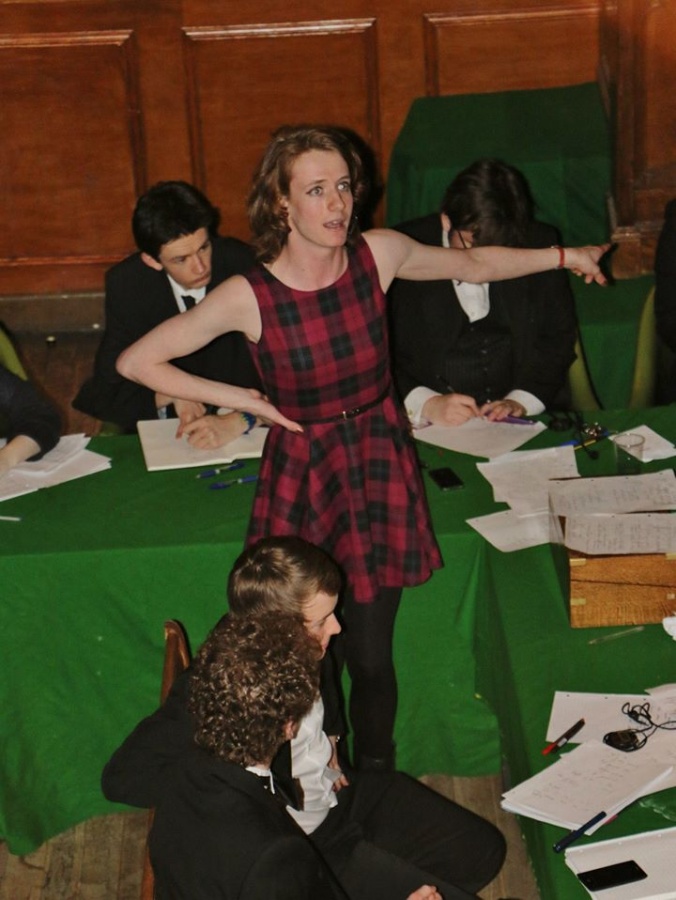Trans debaters ought to be welcomed, not only tolerated: Crash Wigley argues in favour of pronoun introductions
Having been openly trans for a while, at the beginning of this year I abandoned my old name and started dressing more unambiguously femininely. When I went to debating competitions it was obvious that there were some practical things that needed to do be done to make debating an enjoyable experience for transgender people. In particular, I argued that the debating circuit should implement pronoun introductions at the start of debates. Since then I’ve been really pleased with the UK debating circuit’s openness to pronoun introductions, and numerous competitions have used them successfully.
For reference, I use the words trans and transgender interchangeably to refer to people whose gender doesn’t match up with the gender they were assigned at birth, and/or who have genders other than female or male. This includes trans men, trans women and people with non-binary identities (e.g. genderqueer people, gender neutral people and many other identities).
While trans people aren’t hugely numerous, there are probably more of us than many cis (i.e. not trans) people would expect. I know plenty of other trans people who are intelligent, argumentative and politically engaged. We should be thinking about why they might tend not to debate, as well as making the circuit an accessible experience for the trans debaters who already are present and involved.
The deal with misgendering
During debates speakers use gendered language to talk about the other people in the debate, whether by saying “sir” or “madam” when offering a POI, or using pronouns to refer to what previous speakers have said (e.g. “Speaker X said this, but what he doesn’t understand is…”). Similarly, judges refer to speakers using gendered pronouns during the deliberation, when calling speakers up to speak and when explaining the call and giving feedback.
In debates, trans people put themselves at risk of being publicly misgendered, meaning being referred to by the wrong gender. This can be upsetting. If you are, for example, a transgender man and people repeatedly call you ‘she’ or ‘madam’ during a debate, it can make you feel really self-conscious. This is so prevalent that without pronoun introductions, I expect to be misgendered at every debating competition I attend.
I’m sure that in most cases people would like to know how to avoid these mistakes. Even in the private setting of the judges’ deliberation, judges who care about respecting trans people’s genders should like to know how they want themselves to be talked about. It therefore should become standard practice to do pronoun introductions at the start of each round in debating competitions. It is already common amongst trans circles for people to say what pronoun they prefer when introducing themselves, and it is generally considered polite to ask for somebody’s pronoun preferences if you don’t know.
How pronoun introductions work
At the start of debates, chairs already have to find out in which order the members of each team are speaking. When doing this, chairs should also ask which pronoun each speaker prefers. This is the sort of exchange I envisage:
Chair: So can I check, who is speaking first for opening government?
Kate: Kate.
Chair: And what is your preferred pronoun?
Kate: She.
Chair: And speaking second?
Crash: Crash, and I don’t mind being called either she or they.
Everyone makes a mental note of this information, and then the chair proceeds to ask the speakers on the other teams in a similar and polite fashion. Before or after this spiel, the chair or panel might also want to give their names and pronouns.
Two things are important however. Firstly, all speakers should introduce their names and pronouns to the entire room rather than just write them on the ballot, so that all other speakers know. Secondly, these introductions should happen in all rooms. If you are not trans and don’t get misgendered on a regular basis, you might think this is unnecessary for you. But unless this is true for all speakers in all rooms, it puts a lot of pressure on trans debaters to make a fuss in their rooms. That can be intimidating and make people feel unwelcome. Having to do that makes me feel like I’m constantly demanding special treatment and making a big deal about how trans I am.
All speakers and judges should listen carefully to which pronouns people prefer, and endeavour to use those in their speeches, and in life more generally. If you realise you’ve made a mistake, the best response is to quickly apologise, correct yourself, and then move on. If a speaker doesn’t realise they have misgendered somebody, I think it’s the chair’s duty to remind speakers to use the pronouns that other speakers have asked to be referred to by. If individuals make fun of or mock the system of pronoun introductions, they should be referred to the equity team. If trans debaters are to feel welcomed and not just tolerated, people need to take pronoun introductions seriously.
Competitions who want to introduce this system will need to explain it to all speakers and judges. It is important that people understand the reasons why pronoun introductions have come about, to stop it from becoming something we do “just to be politically correct”. That said, I also think in many ways the system is quite straightforward, and it’s sensible to not to make a huge deal about it.
Potential issues
The main worry I’ve heard is about people who aren’t comfortable making public declarations about their gender for whatever reason. What I’d really like to stress is that pronoun introductions aren’t an affirmation of your gender or identity – they’re an instruction about how you would prefer others to talk about you in a specific context. Pronoun introductions allow people who have a complicated relationship with gender to experiment with different pronoun use in a respectful space. Also, this is why I think it is important to let people say ”I don’t mind” in response to the pronoun question.
In addition, fears that people would feel like they are “betraying themselves” by asking to be referred to by “birth gender” pronouns when they’re closeted seem to me to be overstated. This system gives people more control over the language that other people use to describe them, and that’s helpful for people who have a complicated relationship with gender. Finally, being closeted when trans is unpleasant full stop. To me, it is of greater priority that the circuit can be seen to be valuing, welcoming and supporting the participation of out trans debaters, and in doing so it can increase the confidence of people coming to terms with their gender identity.
The bigger picture
In general, I think the world would be a better place if pronoun introductions became much more common. They already happen a lot in the feminist/LGBTQ/General Liberation-Left circles I’m in, and it would be amazing if in a decade or so they were commonplace in business meetings. Whenever you’re asking a group of people to tell each other their names you should ask them to give their preferred pronouns. It takes the pressure off for trans people to individually tell everyone how they want to be talked about; it makes non-trans people aware of the potential existence of transgender people and it shows that you care about how people identify rather than just slapping on whatever label you decide fits best.
Pronoun introductions are especially useful for people who are in the process of transitioning or have a non-binary gender. They give people the opportunity to experiment with, for example, being called “they” without it having to be such a big deal. They also provide space for people to define their relationship to gender in other ways. For instance, some people like being referred to as “they” for ideological feminist reasons, because it limits the extent to which we are gendered unnecessarily.
For many trans people, pronoun introductions are a bare minimum to feel in any way comfortable. That is why I would like these introductions to proliferate more generally in society. I hope that our debating circuits can play a pioneering role for this to happen.
This is an abridged version of a text written a month ago. Originally, the document was published as Google Doc.
Crash Wigley/nbo/hug
Crash Wigley is a third-year undergraduate student studying Philosophy, Politics and Economics at the University of Oxford. They began debating in high school, and they have represented Wales (their home nation) and Oxford at various national and international tournaments. Crash is especially keen to expand schools-level debating in Wales and across the UK. They were the CA of the International Competition for Young Debaters 2014, and they are convening this year’s Oxford Schools Debating Competition. Crash has also been the trans representative for Oxford’s LGBTQ Society, and they are currently the chair of the University’s LGBTQ Campaign.
The Mittwochs-Feature: every Wednesday at 10 am, the “Wednesday Feature” introduces an idea, a debate, a book or a person. If you want to kick off a debate, send us your proposal via email at team [at] achteminute [dot] de.







